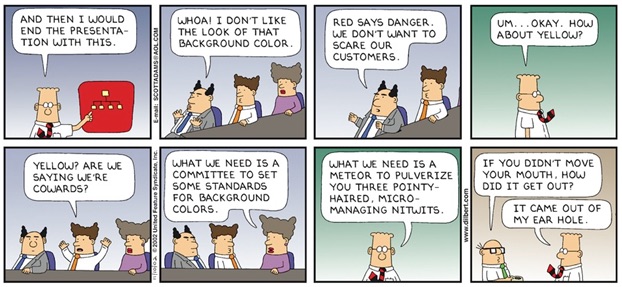Mission Command – the Antidote to Micro-managing!
01/12/2017


A couple of weeks ago, we looked at whether organisations are actually applying “Command & Control” in the way they manage their processes and staff, or whether in fact they are just employing poor management practices.
We are living and working in a VUCA (Volatile, Uncertain, Complex and Ambiguous – examples in previous blog on the subject) world, yet many corporate and public-sector organisations manage and operate as if it is quite the opposite, where supposed leaders are getting involved in levels of decision-making that are far below their pay-grade!
There appears to be some highly relevant learning we can adopt from the military today to inform how we might differently handle such a world!
And if you think – “Well it’s easier for them!”, it’s definitely not – not in today’s highly fragmented and politically-charged, social-media connected landscape around the world.
So the critical concept is mainly referred today as Mission Command (which came out of the Napoleonic Wars, with a few refinements), and below we’ll highlight 3 specific practices that could revolutionise the agility of your organisation:
- Leaders focus on decisions only they can make: Leaders push out decision-making as far as possible to the front-line because Individuals and teams closest to the problem, armed with unprecedented levels of insights from across their information network, offer the best ability to decide and act decisively. Leaders must resist the temptation to dive in and “solve” a problem that should have someone else’s name on it. And leaders and managers will be surprised by the small number of decisions only they can make!
- Leaders should establish Command Intent or Mission Command: It means focusing on the “why” and “what (and in my view, even “what” could be considered too directional) ,” while leaving the “how” to those closer to the front line. It means not micromanaging. As U.S. Army Gen. George S. Patton is quoted as saying, “Never tell people how to do things. Tell them what to do, and they will surprise you with their ingenuity.” The vision is to develop a leadership doctrine that is principles-based, rather than rules-based. This idea is a world apart from what exists in many companies. Most frontline employees are instructed to follow “one best way” rules (see previous blog in June on “Use of Best Practice – the Well-trodden Path to Mediocrity”), with organizations checking to ensure that employees have followed rules to the letter.
- Leaders should find a “Directed Telescope”: A term for using a small number of trusted officers as the Leader’s eyes and ears in the field. In the corporate world, a directed telescope pipeline of information can come in the form of senior advisors, external coaches or trusted colleagues at any level from inside the organisation or from outside.
Increasing leadership agility, and thus the agility of the organisation is difficult. It requires changes to ingrained mind-sets and behaviours of senior individuals who have been successful in their own careers. Managers who recognise the need for organisational change usually fail to see themselves as one of the things that needs changing!
BUT, one word of warning – there is a difference between military leaders’ behaviours when in the field and when back in barracks after deployment. In this country at least, they effectively return to the world of the UK Government. Here the assumption that the world is stable and predictable still reigns supreme, even though the real world is VUCA. The Government can largely get away with this, because elections only take place every five years, by that time mistakes will have been forgotten by many or new promises for improvement can be offered, and taxes can always be raised to keep the bigger part of icebergs under water. Add to this a mind-set of risk aversion and seeking value for money (i.e., go for the lowest cost to avoid upsetting taxpayers), and you end up with a bureaucracy and culture where making mistakes and being inefficient (unavoidable in a VUCA world) is career limiting!
There is a way out of this, and that is by creating a hybrid organisation!
More next time!
Categories & Tags:
Leave a comment on this post:
You might also like…
Company codes – CUSIP, SEDOL, ISIN…. What do they mean and how can you use them in our Library resources?
As you use our many finance resources, you will probably notice unique company identifiers which may be codes or symbols. It is worth spending some time getting to know what these are and which resources ...
Supporting careers in defence through specialist education
As a materials engineer by background, I have always been drawn to fields where technical expertise directly shapes real‑world outcomes. Few sectors exemplify this better than defence. Engineering careers in defence sit at the ...
What being a woman in STEM means to me
STEM is both a way of thinking and a practical toolkit. It sharpens reasoning and equips us to turn ideas into solutions with measurable impact. For me, STEM has never been only about acquiring ...
A woman’s experience in environmental science within defence
When I stepped into the gates of the Defence Academy it was the 30th September 2019. I did not know at the time that this would be the beginning of a long journey as ...
Working on your group project? We can help!
When undertaking a group project, typically you'll need to investigate a topic, decide on a methodology for your investigation, gather and collate information and data, share your findings with each other, and then formally report ...
From passion to purpose: My journey at the Pinnacle of Aviation
By: Sultana Yassin Abdi MSc Air Transport Management, Current Student Born and raised in the vibrant landscape of the UAE, with roots stretching back to Somalia, my life has always been ...






